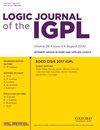通用推理程序简图
IF 0.8
4区 数学
Q2 LOGIC
引用次数: 0
摘要
单个重要实例可支持一般性结论,但可能存在例外。人类的实际推理(如道德和法律规范性:容忍例外的一般规则)、涉及外部现实的人类理论推理(如经验科学和社会科学:使用案例研究和生物模型)以及抽象领域(可能与思维无关,如纯数学:使用任意对象)都是这种情况。虽然现代人已经认识到了这一点,但目前支持一般性结论的模型并未捕捉到这一过程。本文阐述的论点是,有一种推理,即通类推理,以前未被承认为一种独立的推理类型。通用推理理论解释了一个重要实例如何支持一般结论,并容忍可能出现的例外情况。本文的工作假设是,一般推理与目前公认的各种 "纯 "推理是不可还原的。本文旨在从理论和应用两方面理解一般推理。本文章由计算机程序翻译,如有差异,请以英文原文为准。
Generic reasoning: A programmatic sketch
A single significant instance may support general conclusions, with possible exceptions being tolerated. This is the case in practical human reasoning (e.g. moral and legal normativity: general rules tolerating exceptions), in theoretical human reasoning engaging with external reality (e.g. empirical and social sciences: the use of case studies and model organisms) and in abstract domains (possibly mind-unrelated, e.g. pure mathematics: the use of arbitrary objects). While this has been recognized in modern times, such a process is not captured by current models of supporting general conclusions. This paper articulates the thesis that there is a kind of reasoning, generic reasoning, previously unrecognized as an independent type of reasoning. A theory of generic reasoning explains how a single significant instance may support general conclusions, with possible exceptions being tolerated. This paper will adopt, as a working hypothesis, that generic reasoning is irreducible to currently recognized kinds of ‘pure’ reasoning. The aim is to understand generic reasoning, both theoretically and in its applications.
求助全文
通过发布文献求助,成功后即可免费获取论文全文。
去求助
来源期刊
CiteScore
2.60
自引率
10.00%
发文量
76
审稿时长
6-12 weeks
期刊介绍:
Logic Journal of the IGPL publishes papers in all areas of pure and applied logic, including pure logical systems, proof theory, model theory, recursion theory, type theory, nonclassical logics, nonmonotonic logic, numerical and uncertainty reasoning, logic and AI, foundations of logic programming, logic and computation, logic and language, and logic engineering.
Logic Journal of the IGPL is published under licence from Professor Dov Gabbay as owner of the journal.

 求助内容:
求助内容: 应助结果提醒方式:
应助结果提醒方式:


